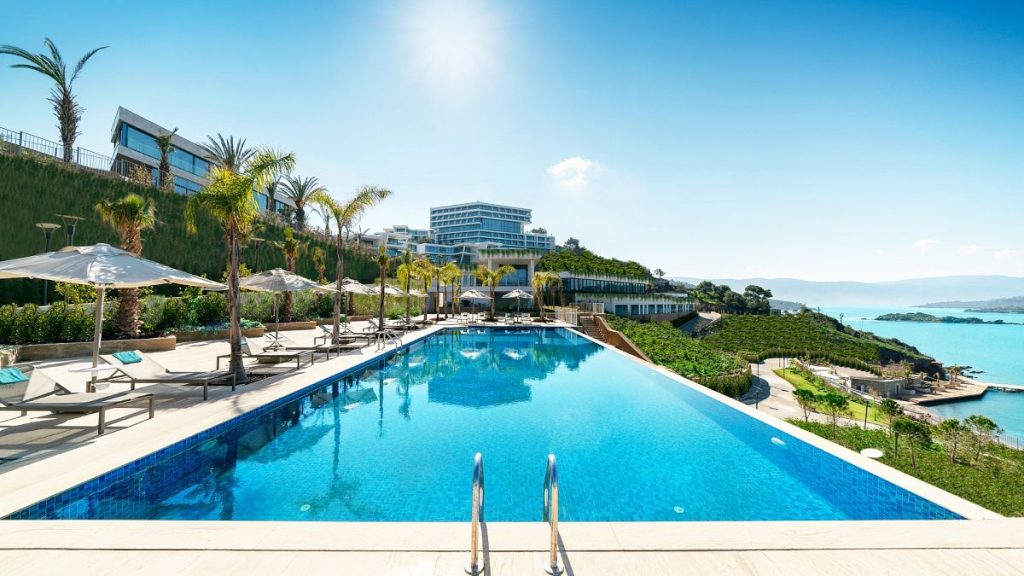Greece, a popular tourist destination, is grappling with the challenge of balancing its thriving tourism industry with the increasing strain on its freshwater resources, exacerbated by climate change and recurring droughts. The Greek parliament is currently debating legislation that proposes a novel solution: allowing hotels, particularly those in coastal areas, to fill their swimming pools with seawater. This measure aims to conserve precious freshwater resources for essential urban uses, especially during peak tourist seasons. While this initiative appears promising on the surface, it has sparked a heated debate, raising concerns about potential environmental consequences and the overall efficacy of the proposed solution.
The urgency of water conservation in Greece cannot be overstated. Over recent decades, the country has witnessed a significant decline in annual rainfall, a trend projected to worsen due to climate change. The Aegean Islands and Crete, renowned tourist hotspots, are particularly vulnerable, having experienced a dramatic reduction in rainfall. This dwindling water supply is further stressed by the influx of millions of tourists annually, placing a considerable burden on the already strained resources. With tourism playing a vital role in the Greek economy, the government is under pressure to find sustainable solutions that ensure the long-term viability of both the tourism sector and the environment. The proposed seawater pool initiative is part of this effort to reconcile economic interests with environmental sustainability.
The proposed legislation focuses on establishing a regulatory framework for the extraction and pumping of seawater into hotel swimming pools. This framework intends to streamline the process for hotels wishing to adopt this water-saving measure. It’s important to note that hotels will not be mandated to use seawater; rather, the legislation aims to facilitate the necessary infrastructure development for those who choose to do so, particularly in areas facing water restrictions. This approach seeks to provide hotels with an alternative water source, thereby reducing the pressure on limited freshwater supplies.
However, the plan has drawn criticism from environmental groups and concerned citizens who raise valid concerns about the potential ecological impact. A primary concern revolves around the discharge of chemically treated seawater back into the marine environment. Seawater pools, like freshwater pools, require disinfection, typically using chlorine. The discharge of chlorinated seawater raises concerns about the potential harm to marine life, including fish and other organisms sensitive to chemical imbalances. Furthermore, the proposal lacks specific quality standards for the discharged water, amplifying anxieties about the potential disruption of the delicate marine ecosystem.
Another significant concern relates to the potential for sewage contamination during the construction and operation of seawater pipelines. Critics argue that the proposal fails to adequately address this risk, leaving open the possibility of harmful pollutants entering the marine environment. The construction process itself poses a threat to the seafloor, potentially damaging sensitive habitats and disrupting marine life. These environmental concerns highlight the need for a more comprehensive and robust regulatory framework that addresses the potential negative impacts of seawater pool implementation.
Finally, some critics argue that the impact of swimming pools on overall water resources has been overstated. Studies conducted on islands like Mykonos and Paros indicate that pools account for a relatively small percentage of total water consumption. These findings suggest that focusing solely on swimming pools may not be the most effective approach to address the broader issue of water scarcity. Instead, they argue for a more holistic approach to water management that encompasses a range of conservation measures, including addressing agricultural water use, which typically accounts for a significantly larger portion of water consumption. Ultimately, the debate surrounding the seawater pool proposal underscores the complex challenge of balancing economic development, environmental protection, and the sustainable management of precious resources in a changing climate.


